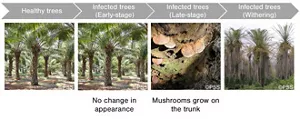Business Alliance Formed with Polar Star Space toward the Establishment of Ganoderma Disease Monitoring Technology on Oil Palm Farms
Kao and Polar Star Space Co., Ltd. have agreed to a business alliance to combat the Ganoderma disease that is causing enormous damage to oil palm farms, and Kao has invested in Polar Star Space. From December, joint demonstrations will begin with the aim of establishing monitoring technology for early detection of Ganoderma disease.
Background
Palm oil and palm kernel oil, which are produced from oil palms, are the most widely consumed vegetable oils in the world, and are used in a wide range of applications, including edible oils and raw materials for surfactants. Demand for these oils is increasing as the world's population increases, necessitating sustainable production and procurement.
Ganoderma disease and challenges for oil palm farms
Ganoderma*1 is the general term for the filamentous fungi of the genus Ganoderma. When oil palms are infected, the fruit yield of the trees gradually declines due to factors such as inhibition of the water transport function, and the trees eventually wither and die. The spread of damage has become a problem in Indonesia and Malaysia, which are major palm oil producing regions, but there is no effective control method at present, and the main countermeasure is to find and cut down infected trees as quickly as possible. However, it is difficult to visually distinguish the infection in its early stages, and by the time it is possible, there are many cases where the infection has already spread to the surrounding area (Figure 1). Currently, many farms are managing the disease by having staff walk around and inspect the trees, but because large farms can be more than 100,000 hectares, the burden of labor costs and the lack of specialists have led to problems such as reduced diagnostic accuracy.
-
* 1 Boninense (scientific name: Ganoderma boninense) is the main species that damages oil palms.

Figure 1. Oil palm infected with Ganoderma
Details of future initiatives
Kao aims to establish technology to manage Ganoderma in oil palm farms together with Polar Star Space which possesses remote sensing technology that can measure objects from a distance without touching them.
(1) Monitoring technology by drones equipped with camera sensors
By analyzing a tree's spectroscopic information (spectrum) with a special camera sensor, it is possible to detect the early-stages of Ganoderma, which are difficult to see with the naked eye. By mounting this camera sensor on a drone and taking pictures from above, Polar Star Space will develop a monitoring technology that efficiently discovers and manages early-stage infected trees (Figure 2).
(2) Field test of monitoring technology at oil palm farms
Kao has production bases for oleo chemicals near palm oil production areas in Indonesia and Malaysia, and aims to ensure traceability to oil palm smallholders with the aim of sustainable procurement. Utilizing the cooperative relationship with the supply chain that Kao has built, field tests will be conducted to see if the developed monitoring technology can actually be applied to palm farms.

Figure 2. Images of monitoring technology that efficiently discovers and manages early-stage infected trees
Conclusion
The two companies aim to establish monitoring technology through technological development and field tests, and also plan to consider providing services to oil palm farms. In the future, Kao and Polar Star Space aim to contribute to sustainable palm oil production and procurement by achieving Ganoderma control in combination with the adjuvant technology cultivated in Kao's agricultural business.
Overview of Polar Star Space Co., Ltd.
CEO: Takahiro Nakamura
Address: the 4th floor of the Maruhiro Kyobashi Building, 1-5-12, Kyobashi, Chuo-ku, Tokyo
Established: April 20, 2017
No. of employees: 10 (as of October 31, 2022)
Business description: Providing data-driven problem-solving services in the agricultural field based on remote sensing technology (drones and microsatellites) and spectrum analysis technology
About Kao
Kao creates high-value-added products and services that provide care and enrichment for the life of all people and the planet. Through its portfolio of over 20 leading brands such as Attack, Bioré, Goldwell, Jergens, John Frieda, Kanebo, Laurier, Merries, and Molton Brown, Kao is part of the everyday lives of people in Asia, Oceania, North America, and Europe. Combined with its chemical business, which contributes to a wide range of industries, Kao generates about 1,420 billion yen in annual sales. Kao employs about 33,500 people worldwide and has 135 years of history in innovation. Please visit the Kao Group website for updated information.
Media inquiries should be directed to:
Corporate Strategy
Kao Corporation
